
Crosby, Stills & Nash is the debut studio album by British–American folk rock supergroup Crosby, Stills & Nash (CSN), released in 1969 by Atlantic Records. It is the only album released by the band before adding Neil Young to their line-up. The album spawned two Top 40 singles, "Marrakesh Express" and "Suite: Judy Blue Eyes", which peaked respectively at No. 28 the week of August 23, 1969, and at No. 21 the week of December 6, 1969, on the US Billboard Hot 100. The album itself peaked at No. 6 on the US Billboard Top Pop Albums chart. It has been certified four times platinum by the RIAA for sales of 4,000,000.

CSN is the fifth album by Crosby, Stills & Nash, released on Atlantic Records on June 17, 1977. It is the group's second studio release in the trio configuration. It peaked at No. 2 on the Billboard Top Pop Albums chart; two singles taken from the album, Nash's "Just a Song Before I Go" and Stills' "Fair Game" charted on the Billboard Hot 100. It is currently the trio configuration's best selling record, outselling 1969's Crosby, Stills & Nash by 200,000 copies. It has been certified quadruple platinum by RIAA.
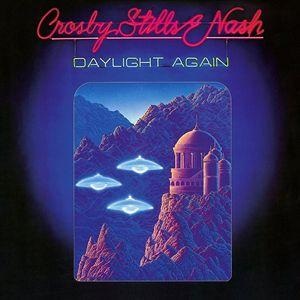
Daylight Again is the seventh album by Crosby, Stills & Nash, and their third studio album in the trio configuration. It peaked at No. 8 on the Billboard 200 albums chart, the final time the band has made the top ten to date. Three singles were released from the album, all making the Billboard Hot 100: "Wasted on the Way" peaked at No. 9, "Southern Cross" at No. 18, and "Too Much Love to Hide" at No. 69. The album was certified platinum by the RIAA with sales of 1,850,000.

So Far is the fourth album by Crosby, Stills & Nash, their third as Crosby, Stills, Nash & Young, and the first compilation album released by the group. Shipping as a gold record and peaking at No. 1 on the Billboard Top Pop Albums chart, it was the band's third chart-topping album in a row. It has been certified six times platinum by the RIAA, and is the second best-selling album by any configuration of the quartet in tandem after their 1970 studio album, Déjà Vu.

Manassas is the 1972 debut double album by Manassas, a blues rock group led by American musician Stephen Stills, released April 1972. It was a critical comeback for Stills, and continued his commercial success by being certified Gold only a month after being released and peaking at number 4 on the US charts.

Songs for Beginners is the debut solo studio album by English singer-songwriter Graham Nash. Released in May 1971, it was one of four high-profile albums released by each partner of Crosby, Stills, Nash & Young in the wake of their chart-topping Déjà Vu album of 1970, along with After the Gold Rush, Stephen Stills and If I Could Only Remember My Name. Songs for Beginners peaked at No. 15 on the Billboard Top Pop Albums chart, and the single "Chicago" made it to No. 35 on the Billboard Hot 100. It has been certified a gold record by the RIAA.
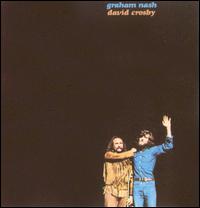
Graham Nash David Crosby is the first album by the partnership of David Crosby and Graham Nash, released on Atlantic Records in 1972, catalog SD 7220. It peaked at No. 4 on the Billboard 200 albums chart, and a single taken from the album, "Immigration Man", peaked at No. 36 on the Billboard Hot 100 on June 17 and 24, 1972. It was certified gold by the RIAA, and it was dedicated to Joni Mitchell, as "to Miss Mitchell".
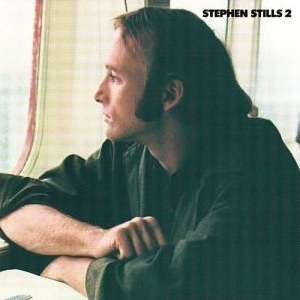
Stephen Stills 2 is the second solo album by Stephen Stills, released on Atlantic Records in 1971. It peaked at number eight on the Billboard 200 and was certified as a gold record by the RIAA. Two singles were released from the album, both just missing the Top 40 on the Billboard Hot 100 chart: "Change Partners" peaked at number 43; while "Marianne" peaked at number 42.

Down the Road is the second and last studio album by Stephen Stills' band Manassas. It was released in April 1973, and peaked at number 26 in the US charts, to mixed reviews. "Isn't It About Time", a protest song, was released as the lead single and reached number 56 on the charts.
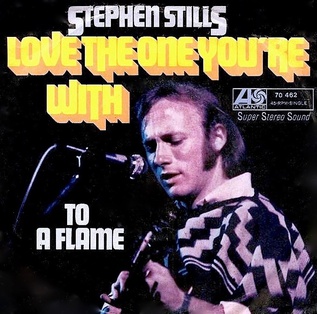
"Love the One You're With" is a song by folk rock musician Stephen Stills. It was released as the lead single from his debut self-titled studio album in November 1970. The song, inspired by a remark Stills heard from musician Billy Preston, became his biggest hit single, peaking at No. 14 on the Billboard Hot 100 in early 1971. David Crosby and Graham Nash, Stills' fellow members of Crosby, Stills & Nash, provide background vocals on the song. The song was also covered by a number of artists, notably the Isley Brothers, The Meters, Bucks Fizz, Luther Vandross, Bob Seger and Richard Clapton.
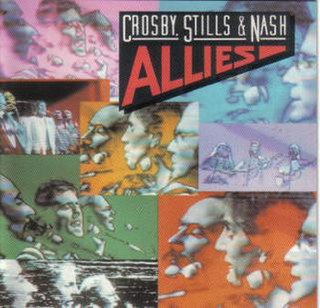
Allies is the eighth album by Crosby, Stills & Nash, their second concert document, and released on Atlantic Records in 1983. A live concert clip for "Wasted on the Way" received some rotation on MTV and VH1 at the time, as did the single "War Games". It peaked at No. 43 on the Billboard 200.
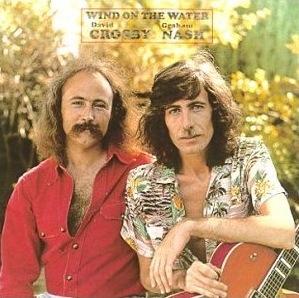
Wind on the Water is the second album by Crosby & Nash, released on ABC Records in 1975. Cassette and 8-track tape versions of the album were distributed by Atlantic Records, to which Crosby, Stills, Nash & Young were signed. It peaked at No. 6 on the Billboard 200 album chart and was certified gold by the RIAA. Three singles were released from the album, "Carry Me," "Take the Money and Run," and "Love Work Out," of which only the first charted, peaking at #52 on the Billboard Hot 100 singles chart.

Whistling Down the Wire is the third album by Crosby & Nash, released on ABC Records in 1976, the second of the duo's three-album deal with ABC Records. Cassette and 8-track tape versions of the album were distributed by Atlantic Records, to which Crosby, Stills, Nash & Young were signed. It peaked at No. 26 on the Billboard 200 album chart and was certified gold by the RIAA. Two singles were released from the album, "Out of the Darkness" and "Spotlight," of which only the first charted on the Billboard Hot 100, peaking at #89.

Stephen Stills Live is a live album by Stephen Stills, released on Atlantic Records in 1975. Recorded on his first solo tour since 1971 and released after he had signed to Columbia Records. It peaked at number 42 on the US charts.
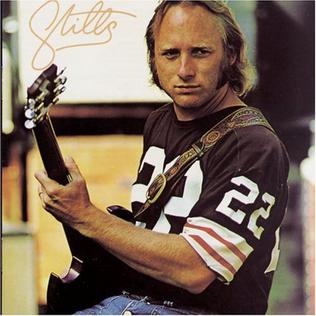
Stills is a 1975 studio album by American musician Stephen Stills. It is his third solo album and his first release on Columbia Records. The album was a commercial success on release, charting at number 19 on the US album charts, but was released to mixed critical reaction.
"Just a Song Before I Go" is a song by Crosby, Stills and Nash that appeared on the 1977 album CSN. It was also released as a single and reached number 7 on the Billboard Hot 100 for consecutive weeks ending August 27 and September 3, 1977, becoming the band's highest charting hit. It is also one of the band's shortest songs, with a running time of only 2:14. In Canada, it peaked at number 10.

"Teach Your Children" is a song written by Graham Nash in 1968 when he was a member of the Hollies. Although it was never recorded by that group in a studio, the Hollies did record it live in 1983. The song first appeared on the album Déjà Vu by Crosby, Stills, Nash & Young, released in 1970. As a single, the song peaked at No. 16 on the Billboard Hot 100 charts that year. On the Easy Listening chart, it peaked at No. 28. In Canada, "Teach Your Children" reached No. 8. Reviewing the song, Cash Box commented on the "incredible soft harmony luster" and "delicately composed material." Stephen Stills gave the song its "country swing", replacing the "Henry VIII" style of Nash's original demo.

4 Way Street is the third album by Crosby, Stills & Nash, their second as Crosby, Stills, Nash & Young, and their first live album. It was originally released as Atlantic Records SD-2-902, shipping as a gold record and peaking at No. 1 on the Billboard 200. A document of their tour from the previous year, the live recordings presented were taken from shows at the Fillmore East on June 2 through June 7, 1970; The Forum on June 26 through June 28, 1970; and the Auditorium Theatre on July 5, 1970.

"Ohio" is a protest song and counterculture anthem written and composed by Neil Young in reaction to the Kent State shootings of May 4, 1970, and performed by Crosby, Stills, Nash & Young. It was released as a single, backed with Stephen Stills's "Find the Cost of Freedom", peaking at number 14 on the US Billboard Hot 100 and number 16 in Canada. Although a live version of "Ohio" was included on the group's 1971 double album 4 Way Street, the studio versions of both songs did not appear on an LP until the group's compilation So Far was released in 1974. The song also appeared on the Neil Young compilation albums Decade, released in 1977, and Greatest Hits, released in 2004.
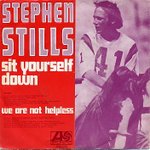
"Sit Yourself Down" is a song written by Stephen Stills that was released on his 1970 solo debut album Stephen Stills. It was also released as the second single from the album, following the Top 20 hit "Love the One You're With." and reached the Top 40, peaking at #37.



















